How people pleasing can get in the way of body trust. Stop listening to others and improve your body image. Quiet food noise. Achieve full recovery from eating disorders and disordered eating with support from an ED dietitian in Washington and Colorado. Online and in-person treatment are available.
Read MoreUnderstand the pivotal role of families in eating disorders recovery. Implement these tips from Colorado and Washington dietitian and ed specialists to support your child while they undergo treatment for anorexia, bulimia, BED, ARFID, OSFED, and disordered eating. Provide and receive support to help your teen recovery from an eating disorder.
Read MoreGet support from CO and WA dietitians for family-based treatment for eating disorders recovery in children and teens. Understand FBT and the role of a dietitian during treatment for anorexia, bulimia, BED, OSFED, and
Read MoreGet outpatient treatment with a dietitian nutritionist in Washington and Colorado to fully recover from an eating disorder. Understand what recovery means and looks like. Online and in-person medical nutrition therapy with a Woodinville nutritionist can help you overcome anorexia, bulimia, ARFID, BED, orthorexia, and disordered eating.
Read MoreGet support from a Washington dietitian nutritionist and learn how to overcome restrictive eating disorders. Outpatient nutrition therapy from expert ED dietitians in Woodinville and Colorado can help you achieve recovery from ARFID, orthorexia, and anorexia nervosa.
Read MoreSupporting someone with an eating disorder can be both challenging and deeply rewarding. Loved ones—whether family members, friends, or partners—play a crucial role in the recovery process. They provide emotional support, encouragement, and often serve as a grounding force during difficult times. However, it’s important to recognize that supporting someone in recovery requires knowledge, patience, and boundaries.
Read MoreOne of the most difficult aspects of eating disorder recovery is navigating social situations—whether it's family gatherings, eating out with friends, or holiday celebrations. Food is often at the center of social interaction, and for someone recovering from an eating disorder, these situations can feel overwhelming and anxiety-provoking. The pressure to conform to social expectations around food, appearance, and behavior can trigger feelings of shame or insecurity.
Read More“Clean eating” has become a popular way to improve health. The focus is on whole, unprocessed foods and avoiding anything “artificial” or “junk.” It seems like a straightforward way to adopt healthier habits. However, when clean eating becomes a rigid set of rules, it can lead to disordered eating. Recognize the signs of disordered eating and repair your relationship with food with outpatient nutrition therapy.
Read MoreManage food obsession so you can recover from anorexia, bulimia, BED, orthorexia, and disordered eating. Improve your relationship with food and body. Get online, outpatient nutrition therapy with dietitians from Colorado and Washington.
Read MoreBreaking free from body checking is possible, but it takes time, intention, and support. Here are actionable steps to help you reduce this behavior and focus on building a healthier relationship with your body.
Read MoreBody checking is a behavior many people engage in, often subconsciously, as a way to monitor or assess their physical appearance. While it may seem harmless or routine, body checking can have a significant emotional and mental toll, particularly for those with body image concerns or eating disorders.
Read MoreThe holiday season can be a magical time filled with celebrations, connection, and joy. But for those in eating disorder recovery, it can also bring unique challenges—large family meals, diet talk, and an overwhelming focus on food and appearance. If this resonates with you, know that you’re not alone, and there are ways to navigate this season with compassion and confidence.
Read More












